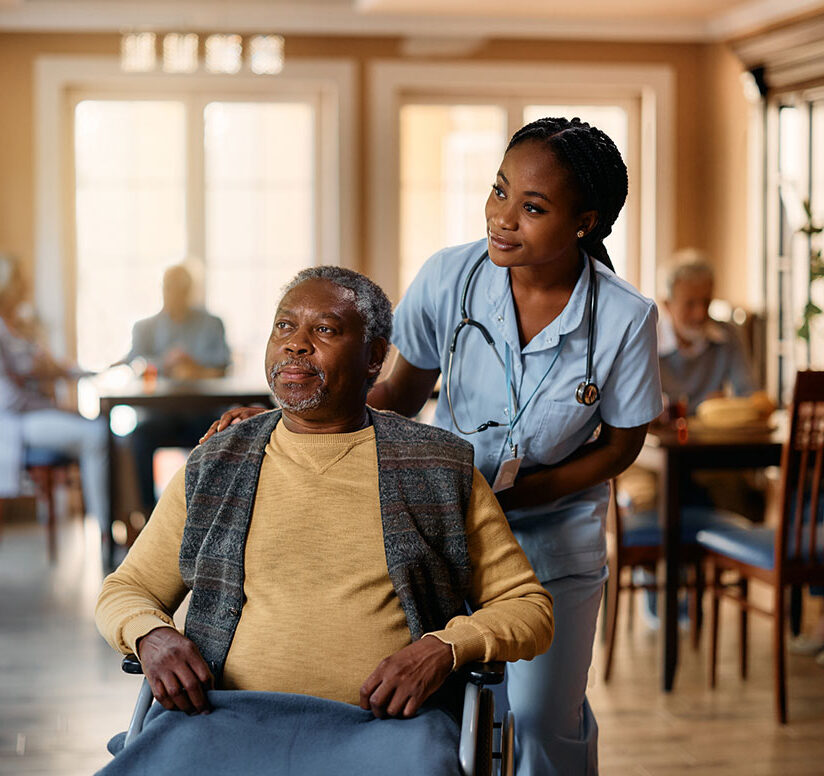CMS Proposes Revisions to PASRR Rule
CMS published a proposed rule on February 20 that would revise requirements for Preadmission Screening and Resident Review (PASRR). The PASRR process assesses the needs of individuals with mental illness or intellectual disability applying to or residing in Medicaid-certified nursing homes. The purpose of this process is to ensure that individuals are not placed in nursing homes unnecessarily or without adequate services to support successful maintenance in the environment. The PASRR program was created as part of the Omnibus Budget Reconciliation Act of 1987 (OBRA ’87) and this proposed rule represents the first significant revision of the program since implementation.
While many of the changes seek to clarify or reinforce requirements already in statute, this overhaul could have significant implications for nursing homes. Recall that the PASRR program is ultimately implemented at the state level through the state Medicaid authority, and the proposed rule leaves opportunity for states to tailor some aspects of the program to fit the individual state’s needs and resources. LeadingAge will be soliciting feedback from members and coordinating with other stakeholder groups as we prepare formal comments on the rule, which must be submitted by April 20. The following analysis highlights key components of the proposed rule. Some of the proposed changes reflect actual changes to the rule and program while other proposed changes simply clarify existing statutory requirements.
Technical updates
Language in the rule will be updated to reflect current terminology. For example, references to PASARR will be replaced with PASRR, as the annual review has not been required since 1996. References to initial reviews will be removed since the April 1, 1990 deadline for initial reviews is no longer relevant. References to the Diagnostic and Statistical Manual of Mental Disorders (DSM) will be updated to reflect the most recent version (DSM-V) and references to the manual used to determine the presence of intellectual disability will be updated to its most recent version, Intellectual Disability: Definition, Classification, and Systems of Support, 11th Edition. Outdated terms around individuals with mental illness and individuals with developmental or intellectual disabilities will be updated to reflect currently accepted terms.
Definitions
Along the lines of updating terms, definitions will also be updated according to current standards. These changes are especially important, as they will potentially impact PASRR program criteria. The definitions of mental illness and intellectual disability will follow the current respective manuals. The definition for dementia will be updated to incorporate the DSM-V’s categorization of dementia as a “major neurocognitive disorder”, which will also impact PASRR program criteria. For example, mild cognitive impairment will no longer qualify for dementia consideration.
Level I Identification Screening
A Level I identification screen must be completed prior to admission for all individuals applying to enter a nursing home. This requirement includes those individuals who are admitting to a nursing home for skilled care following an acute care hospitalization, also known as the “hospital discharge exemption.” This language will be added to clarify existing statutory requirements. All positive Level I identification screens that identify possible mental illness or intellectual disability must be forwarded to the PASRR program, including those that are exempted from a Level II evaluation and determination through hospital discharge exemption or provisional admission.
Exemptions
Exempted Hospital Discharge: Criteria for a hospital discharge exemption will remain the same. Individuals who are discharging from an acute care hospital to a skilled nursing facility for post-acute care will receive a hospital discharge exemption if the individual meets the following criteria:
- Admitted directly from the hospital after receiving acute inpatient care,
- Requires nursing facility services for the condition for the which the individual received care in the hospital, and
- Has been certified by the attending physician to likely require fewer than 30 days of nursing services.
This exemption means that a Level I identification screen must be completed on these individuals prior to admission to the nursing home but the individual is exempt from a Level II evaluation and determination for stays under 30 days. Stays exceeding 30 days require a Level II evaluation and determination as outlined below in “Resident Reviews” and “Timelines”.
Provisional Admissions: This rule proposes a new exemption called “provisional admissions”. Provisional admissions would generally replace the current categorical determinations. Individuals would be considered a provisional admission under the following provisions:
- Emergency stays due to emergency evacuations or protective services placements not to exceed 14 days.
- Individuals with delirium where the delirium prevents an accurate diagnosis at the time of entry into the nursing home but is expected to clear within 14 days.
- Respite stays of up to 30 consecutive days to provide respite to in-home caregivers.
- Convalescent stays of up to 30 days in which an applicant requires a stay in the nursing home to recover from an acute physical illness that required hospitalization but did not meet criteria for an exempted hospital discharge.
Individuals that qualify as a provisional admission will require a Level I identification screen prior to admission to the nursing home but are exempt from a Level II evaluation and determination for stays that meet the provisions above. For stays exceeding the provisions above, a Level II evaluation and determination would be required as outlined below in “Resident Reviews” and “Timelines”.
As noted above, categorical determinations will be removed. This means that exemptions based on dementia diagnosis, serious physical illness, etc. will no longer apply. All individuals will require a Level I identification screen. However, the Level II evaluation and determination may be terminated for individuals that would have previously fallen into the categorical determination if the evaluator determines that these individuals have a level of impairment so severe that they cannot effectively be evaluated.
Level II Evaluation and Determination
A Level II evaluation and determination is required for any individual whose Level I identification screening indicated possible mental illness or intellectual disability. For new admissions to a nursing home that do not meet hospital discharge exemption criteria and are not considered a provisional admission, a Level II evaluation and determination must be completed prior to admission to the nursing home when the Level I identification screen has identified possible mental illness or intellectual disability. See below “Resident Reviews” for information regarding hospital discharge exemptions and provisional admissions.
The rule proposes that findings of a Level II evaluation and determination must be communicated in writing or electronically. They can no longer be communicated orally. Findings and recommendations must be communicated to the resident/representative, the nursing home, the individual’s physician, and the hospital as applicable.
Resident Reviews
A resident review Level II evaluation and determination must be completed for individuals with a positive Level I identification screen indicating possible mental illness or intellectual disability. Resident reviews are completed for individuals who:
- Were admitted with a hospital discharge exemption and have exceeded the 30-day stay.
- Were admitted as a provisional admission and have exceeded the allotted stay for the specific provision.
- Previously had a Level II evaluation and determination completed and now show a significant change in physical or mental condition.
A resident review Level II evaluation and determination must also be completed for individuals who the nursing home identifies may have a possible mental illness or intellectual disability that was not previously identified through the Level I identification screen.
Timelines
The rule proposes to require all Level II evaluations and determinations must be completed by the 9th calendar day following notification to the PASRR program of a positive Level I identification screen or the expiration of an exemption period. Due to the various proposed exemptions and provisional admissions, this presents a number of deadlines.
Hospital discharge exemption: A hospital discharge exemption period runs 30 days from the date of admission. If an individual with a positive Level I screen and a hospital discharge exemption remains in the nursing home after the 30th day, the nursing home must notify the PASRR program within 24 hours. A Level II evaluation and determination must be completed by the 40th day post-admission.
Emergency and delirium provisional admission exemptions: These exemption periods run 14 days from the date of admission. If an individual with a positive Level I screen who was admitted as a provisional admission due to either emergency or delirium remains in the nursing home after the 14th day, the nursing home must notify the PASRR program within 24 hours. A Level II evaluation and determination must be completed by the 24th day post-admission.
Respite and convalescent provisional admission exemptions: These exemption periods run 30 days from the date of admission. If an individual with a positive Level I screen who was admitted as a provisional admission for respite or convalescent stay remains in the nursing home after the 30th day, the nursing home must notify the PASRR program within 24 hours. A Level II evaluation and determination must be completed by the 40th day post-admission.
Significant change: If a resident in a nursing home with a previous positive Level I identification screen and completed Level II evaluation and determination shows a significant change in physical or mental condition, the nursing home must notify the PASRR program within 72 hours of identifying the significant change. A resident review Level II evaluation and determination must be completed by the 9th calendar day after the nursing home identifies the significant change. Note that the proposed rule bases this timeline on the date that the significant change was identified, not the date that the nursing home completed a significant change assessment through the Resident Assessment Instrument (RAI).
Other Elements of the PASRR Program and Rule
States will have the authority to determine the qualifications of individuals who can complete a Level I identification screen. The State Medicaid Authority is responsible for appointing evaluators for the Level II evaluation and evaluators must be independent from the State Mental Health Authority and the nursing home. The state is also responsible for designating the professionals who would determine the need for nursing facility-level services, though criteria for this determination is also included in the rule.
The circumstances under which a Level II evaluation and determination can be terminated prior to completion have been expanded. An evaluation report must still be generated and explain the reason for termination.
Telehealth may be utilized for Level II evaluation and determination under specific circumstances if not using telehealth would cause a delay in the completion of the Level II evaluation and determination.
If an individual who has been identified through the PASRR program to have mental illness or intellectual disability is discharged from the nursing home, the nursing home must report the discharge outcome to the PASRR program.
Interagency transfers (nursing home to nursing home) and readmissions do not require new Level I identification screens. The rule leaves discretion to the states on how to handle interstate nursing home transfers.
PASRR findings and recommendations must continue to be included in the resident’s care plan for residents who remain in the nursing home. If a nursing home resident is receiving specialized services through the PASRR program, these services must be periodically reviewed.
Impact on Nursing Homes
The PASRR program already requires a great deal of coordination by nursing homes and this rule may add more. The impact on nursing homes will largely depend on factors such as how the PASRR program has operated in individual states up to this point and the ability of the state entities to accommodate new or clarified requirements. As nursing homes are ultimately responsible for the health and well-being of residents in their care, nursing homes will need to ensure that all aspects of the PASRR process are running according to plan for each resident. Nursing homes will need to ensure that all residents have appropriate Level I and Level II documentation as necessary prior to admission. Nursing homes will need to work with other entities to track down missing documentation, potentially resulting in delayed admissions. Nursing homes will need to monitor and make timely notification as needed for exemptions and provisional admissions, and will need to ensure that Level II evaluations and determinations are completed in a timely manner. Nursing homes will need to ensure that recommendations are implemented by the appropriate entity, incorporated into the care plan, and reviewed by the appropriate entity according to requirement. Above all, nursing homes will always be responsible for identifying and pursuing correction of any breakdowns in the process. While this has always been the case, this rule will require more vigilence and legwork on the part of nursing homes than before as all entities seek to incorporate changes.
LeadingAge will continue to review and seek input from members on this proposed rule. In the coming weeks, we will share areas for comment and we welcome your feedback. Please reach out to Jodi Eyigor with any questions or thoughts on this proposed rule.

Most Recommended
October 15, 2025
 Shutdown Week Three: Impact of Ongoing Closure on Affordable Housing
Shutdown Week Three: Impact of Ongoing Closure on Affordable Housing
February 03, 2026
Fiscal Year (FY) Funding 2026
October 07, 2025
Immigrant Workforce Matching Program Brings Workforce Relief
Recently Added
February 04, 2026
 Colleagues on the Move, February 4, 2026
Colleagues on the Move, February 4, 2026
February 02, 2026



